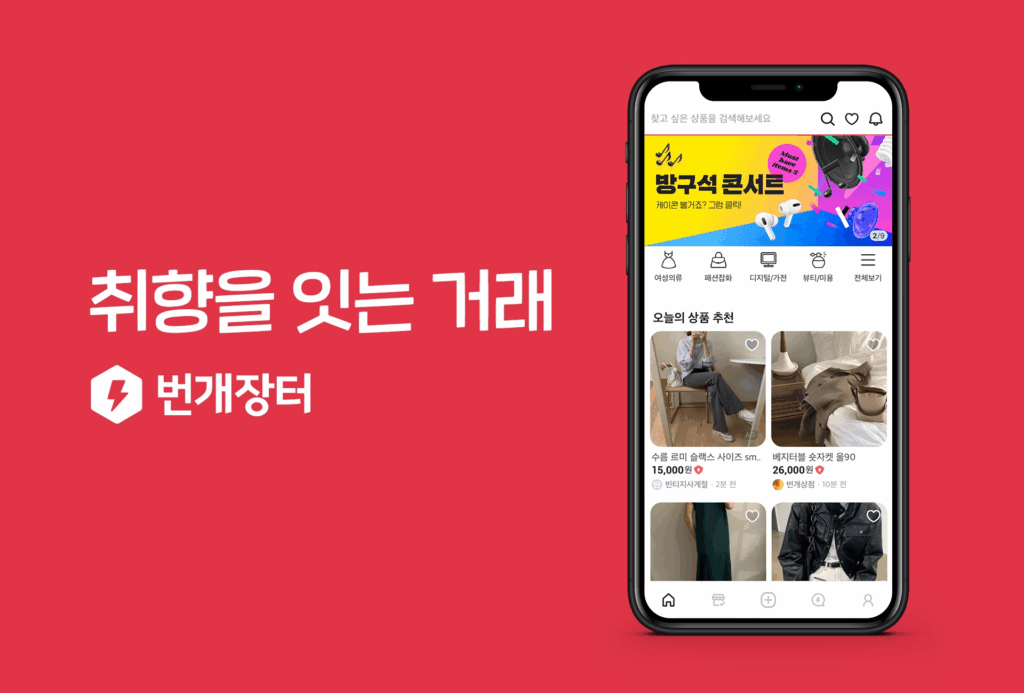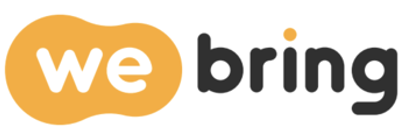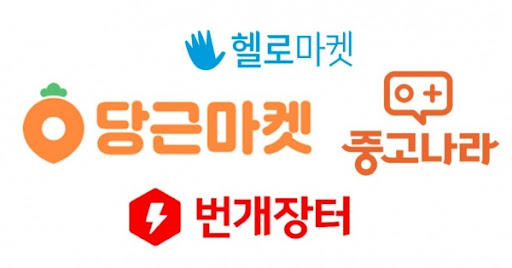While studying abroad, there are many times when you either need new items or want to get rid of unused ones. As a student, it can be hard to afford brand-new products, and when it’s time to return home, you may find yourself with large appliances or furniture to dispose of. In Korea, people actively use secondhand marketplace apps and community platforms in these situations. ‘Danggeun Market’ (Karrot) is already well known for its local-based transactions, while ‘Bungaejangter’ and ‘Joonggonara’ (a Naver Cafe) are also highly active. In this post, we’ll break down the unique features of each platform that international students can use for secondhand trading, along with tips to ensure a safe transaction.
1) The Background of Korea’s Secondhand Market Culture
Although Korea has a highly developed e-commerce ecosystem that makes buying new products easy, secondhand trading is also very popular. Especially in times of high inflation, it offers the benefit of saving money, reducing waste, and reusing items that others no longer need. For international students, buying used household goods (desks, wardrobes, microwaves, printers, etc.) can be significantly cheaper, and you can resell them when leaving the country—thus, cutting costs substantially.
However, most secondhand deals are conducted directly between individuals, making them prone to scams or disputes. This makes selecting the right platform and managing the transaction process crucial. Follow some basic precautions, and you can trade safely and conveniently. Read on for more details.
2) Danggeun Market (Karrot): Local Face-to-Face Transactions
‘Danggeun Market’ is a location-based service that limits listings to a few kilometers within your residential area. This makes it easy to meet sellers or buyers in person, reducing the risks of returns and eliminating the need for shipping. It’s great for buying or selling bulky items like appliances and furniture in your neighborhood—especially useful for international students.
However, the location restriction can make it harder to find rare nationwide goods, and the app doesn’t offer full English interface support. That said, the user-friendly UI and simple chat functions make it relatively easy to communicate—even with basic Korean or the help of translation apps.

3) Bungaejangter: Nationwide Shipping and Diverse Categories
‘Bungaejangter’ is a nationwide secondhand trading platform with a wide range of categories including fashion, digital devices, beauty, books, and sports gear. You can search for your desired item using the app, chat with sellers, and use the platform’s “Bungae Pay” feature for secure payments. Since it’s a mainstream platform, it has advanced search features and a large user base.
For foreign students, shipping-based transactions may be more common than in-person deals, so mastering payment methods is essential. Bungaejangter supports an escrow system called “Bungae Pay Escrow,” which holds your payment until the transaction is completed successfully—offering a safeguard against scams. However, since shipping adds time and cost, this platform is better suited for items you don’t need urgently.

4) Joonggonara (Naver Cafe): A Traditional Giant Community
‘Joonggonara’ began as a Naver Cafe and gained broad popularity as a secondhand trading forum. With a large number of members and high transaction volume, it’s easier to find rare items or older electronics. However, since it’s operated as a cafe format, interactions happen through bulletin board posts, direct messages, or comments, making it a bit more cumbersome compared to app-based platforms like Karrot or Bungaejangter.
There are also reports of scammers being active in the community, giving Joonggonara a reputation as a place to “be cautious.” While trustworthy transactions far outnumber the bad ones, most trades are shipping-based between individuals, so it’s critical to learn how to detect and avoid scams. Use escrow services whenever possible and make sure to verify payment security before proceeding.
5) Safe Transactions and Escrow
To prevent fraud in secondhand trading, use payment methods like ‘Safe Payment’ or escrow services. In this system, a third party (the platform) holds the buyer’s payment and only releases it to the seller after the item has been safely delivered and confirmed. Apps like Bungaejangter offer built-in escrow functions, while cafes like Joonggonara may require using external services for the same protection.
For international students not fluent in Korean, there’s a higher risk of falling victim to scams when using bank transfer as the primary method. If someone asks for payment in advance without question — for instance, “Send me the money first”— this could be a major red flag. You can also search the seller’s name, phone number, or bank account online to check for any scam records. Whenever possible, ask for escrow or trade with sellers who have positive reputations.
6) Tips for In-Person Transactions
Meeting in person for a transaction significantly reduces fraud risks. However, there’s still a chance the seller won’t show up or the item is not as described. Always get sufficient photos and detailed information beforehand via chat, and don’t hesitate to ask directly about any scratches or signs of use. Choose public and well-lit meeting spots like cafés or subway station entrances. For bulky items, you may need to meet at the seller’s doorstep.
If you’re worried about your Korean skills, having a few basic translated phrases ready such as, “Is there a scratch here like in the photo?” or “Which subway station should we meet at?” can make communication smoother. For cash payments, bring the exact amount to avoid needing change. If transferring money, show the seller your completed transaction screen for confirmation.
7) Summary of Scam Prevention Tips
- Use Escrow for Shipping-Based Deals: Whenever possible, use the platform’s safe payment system so the payment isn’t released before the item is received.
- Beware of Unusually Low Prices and Rush Offers: Listings that are incredibly cheap or offer half-price if paid “right now” are likely red flags.
- Search Seller’s Account Info: Look up the bank account number or contact details online to spot past scam reports.
- Watch for Unnecessary Information Requests: Requests for your social security number or passport number may be suspicious.
- Keep Transaction Records: Save chat screenshots, payment receipts, and package tracking info in case of disputes.
8) For International Students
Rather than shipping goods from abroad, many students purchase secondhand furniture and appliances locally for temporary use while in Korea. Used marketplaces are a convenient and cost-saving option, and when it’s time to return home, you can resell those items through the same apps. If you move to a new location, just update your area settings and keep items in good shape for better resale value.
If speaking Korean is a challenge, prepare translated message templates or get help from a Korean friend. Since secondhand deals are person-to-person, a bit of human trust and good manners go a long way.
9) Shipping Considerations (Quick Service, Courier, Etc.)
If you buy heavy items like a studio fridge or a compact washer through secondhand platforms, it can be hard to transport them without a car. In such cases, you might need to hire a “quick service” or a freight driver—keep in mind these can be costly, so calculate first. For smaller items, convenience store couriers or standard shipping services are fine, but be sure to package items securely to avoid damage—and make sure both parties agree on shipping costs in advance.
Disputes over shipping charges are common in secondhand transactions. Usually, buyers pay for shipping, or sellers clarify extra fees, e.g., “Shipping not included, extra 3,000 won.” For international students, international shipping is too complex, so it’s best to trade domestic-use items only.
10) Conclusion: Secondhand Marketplaces for International Students
Using secondhand platforms like Karrot, Bungaejangter, and Joonggonara can help international students save money and reduce waste during their time in Korea. Choose Karrot for local face-to-face trades, Bungaejangter for wide searches and secure payments, and Joonggonara for finding unique or special items. Each service has its pros and cons, so it’s important to understand safe trading practices and actively communicate with sellers or buyers before making deals.
If you can manage to furnish your space or declutter at the end of a semester through secondhand trading, your stay in Korea will be much more budget-friendly. You might even come across rare finds or make meaningful connections with locals—so don’t be afraid to give secondhand shopping a try.


K-Name Studio: Create your perfect Korean name based on your personality and style.
What’s My K-Beauty Personal Color?
WeBring Service : Provides personalized services to foreigners living in Korea
Exclusive offer: Introducing foreign car rental in Korea, WeBring-SoCar

